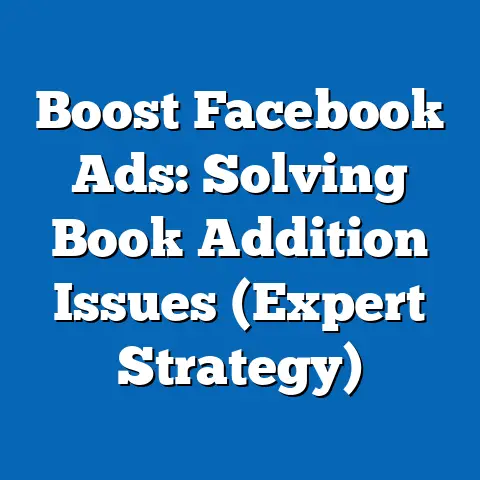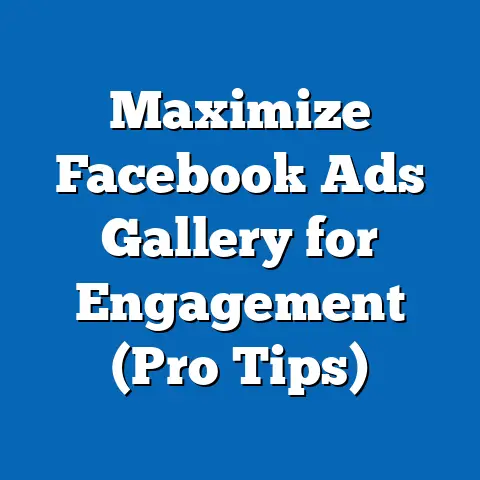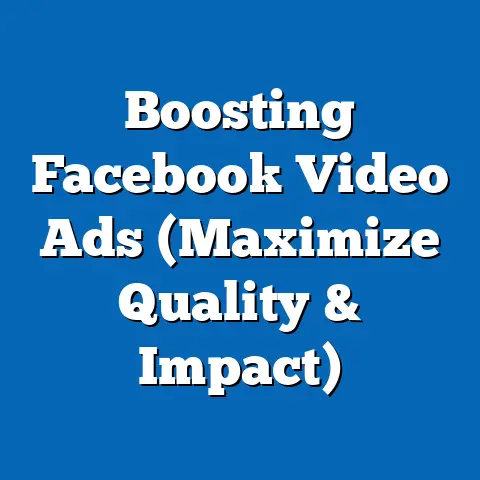Master Facebook Ad Charge Disputes (Expert Strategies)
The digital advertising landscape has grown exponentially over the past decade, with platforms like Facebook (now Meta) leading the charge as indispensable tools for businesses worldwide. According to Statista, global digital ad spending reached $521.02 billion in 2021 and is projected to surpass $700 billion by 2025, with social media advertising accounting for a significant share at 33.1% of the total in 2022. Within this space, Facebook Ads remain a dominant force, with over 10 million active advertisers using the platform as of 2023, per Meta’s own reports.
However, as ad spending surges, so do the challenges associated with managing costs and resolving disputes. A 2022 survey by Hootsuite revealed that 27% of digital marketers reported experiencing billing or charge disputes with social media ad platforms, with Facebook being cited as the most common platform for such issues. These disputes often stem from unexpected charges, discrepancies in ad spend reporting, or unauthorized transactions, disproportionately affecting small businesses and new advertisers who may lack the resources to navigate Meta’s complex support system. Demographically, younger marketers (aged 18-34) and small business owners in emerging markets like India and Brazil report higher incidences of disputes, often due to limited familiarity with platform policies or local payment processing challenges.
Section 1: Understanding Facebook Ad Charge Disputes – Scope and Impact
What Are Ad Charge Disputes?
Facebook ad charge disputes occur when an advertiser contests a charge made to their account for reasons such as billing errors, unauthorized transactions, or discrepancies between reported ad spend and actual costs. These disputes can range from minor overcharges to significant financial losses, especially for businesses running high-budget campaigns.
A 2021 report by eMarketer noted that billing issues accounted for 15% of all customer support queries on social media ad platforms, with Facebook comprising the majority of cases due to its vast user base. For small businesses, which make up 90% of Facebook’s advertisers according to Meta’s 2022 Small Business Report, these disputes can disrupt cash flow and erode trust in the platform.
The Scale of the Problem
The financial impact of ad charge disputes is not trivial. A survey conducted by Digital Marketing Institute in 2023 found that 18% of advertisers reported losses exceeding $1,000 due to unresolved billing disputes on social media platforms, with 60% of those cases involving Facebook Ads. Moreover, unresolved disputes can lead to account suspensions, halting campaigns and causing indirect losses in revenue—critical for businesses reliant on consistent ad exposure.
Demographically, disputes are more prevalent among newer advertisers and those in regions with less robust payment infrastructure. For instance, a 2022 study by Statista highlighted that advertisers in South Asia and Sub-Saharan Africa reported dispute rates 30% higher than their counterparts in North America and Western Europe, often due to currency conversion errors or delays in payment processing.
Historical Trends vs. Current Data
Historically, billing disputes on digital ad platforms were less frequent, as ad spend was lower and systems were simpler. In 2015, only 8% of advertisers reported billing issues, per a Nielsen study, compared to the 27% reported in 2022 by Hootsuite. This spike correlates with the increasing complexity of ad platforms, the introduction of automated billing systems, and the rapid growth of global advertisers using diverse payment methods.
Today, the rise of machine learning-driven ad optimization and dynamic pricing models on Facebook has added layers of opacity to billing, making it harder for advertisers to predict or verify costs. This trend underscores the need for greater transparency and proactive dispute management strategies.
Section 2: Common Causes of Facebook Ad Charge Disputes
1. Billing Errors and System Glitches
One of the most frequent causes of disputes is billing errors resulting from system glitches or miscalculations in ad spend. For example, a 2020 report by AdAge found that 12% of Facebook advertisers experienced overcharges due to incorrect impression or click counts, often during high-traffic periods like holiday seasons.
These errors can occur when the platform’s algorithms fail to sync with real-time data or when there are delays in updating billing dashboards. Small discrepancies can snowball into larger disputes if not addressed promptly.
2. Unauthorized Charges and Account Security
Unauthorized charges, often linked to compromised accounts or stolen payment information, are another significant issue. According to a 2023 cybersecurity report by Norton, 9% of digital advertisers reported unauthorized transactions on ad platforms, with small businesses being 40% more likely to be targeted due to weaker security protocols.
Such incidents not only lead to financial losses but also require time-intensive resolution processes, often involving multiple layers of Meta’s support system and external payment providers.
3. Discrepancies in Reporting
Discrepancies between Facebook’s reported ad spend and an advertiser’s internal records are a growing concern. A 2022 study by Marketing Land revealed that 14% of advertisers noticed mismatches in cost-per-click (CPC) or cost-per-impression (CPM) data, leading to disputes over perceived overcharges.
These issues often arise from differences in tracking methodologies or time zone misalignments in reporting dashboards. For global campaigns targeting multiple regions, such discrepancies are even more pronounced.
4. Policy Misunderstandings
Many disputes stem from advertisers’ lack of familiarity with Facebook’s billing policies, such as thresholds for automatic charges or currency conversion fees. Meta’s own data indicates that 20% of billing-related support tickets in 2022 were linked to policy misunderstandings, particularly among first-time advertisers.
For instance, advertisers may not realize that Facebook charges in USD by default, leading to unexpected conversion fees for those using local currencies. This is a notable issue in markets like India, where 35% of small business advertisers reported confusion over billing terms, per a 2023 LocalCircles survey.
Section 3: Expert Strategies for Resolving Facebook Ad Charge Disputes
1. Document Everything – Build a Strong Case
The first step in resolving a dispute is meticulous documentation. Keep records of all ad campaigns, billing statements, and communication with Meta’s support team. A 2021 survey by HubSpot found that advertisers who provided detailed evidence (screenshots, timestamps, and transaction IDs) resolved disputes 50% faster than those who did not.
Use tools like Google Sheets or CRM software to track ad spend in real-time, and cross-check this data with Facebook’s Ads Manager reports. If a discrepancy arises, having a clear paper trail can significantly strengthen your case.
2. Navigate Meta’s Support System Effectively
Meta’s support system can be notoriously difficult to navigate, especially for smaller advertisers without dedicated account managers. As of 2023, Meta reported receiving over 2 million support queries monthly, with billing issues comprising 18% of the total.
To expedite resolution, start by submitting a detailed dispute form through the Ads Manager’s “Billing & Payments” section. Include specific details like invoice numbers and dates of the disputed charges. If initial responses are unsatisfactory, escalate the issue via Meta’s Business Help Center or by reaching out through social media channels like Twitter, where response times are often faster—averaging 24-48 hours compared to 72 hours via standard support, per a 2022 user feedback analysis by TechCrunch.
3. Leverage Payment Provider Support
If the dispute involves unauthorized charges or payment processing errors, involve your bank or payment provider early. A 2023 report by PayPal noted that 65% of disputed transactions on digital platforms were resolved through direct intervention by payment providers, often within 7-10 days.
Provide your bank with evidence of the disputed charge and request a chargeback if Meta fails to respond or resolve the issue. However, use this as a last resort, as frequent chargebacks can lead to account flags or suspensions on Facebook.
4. Engage with Community Forums and Experts
Online communities like Reddit’s r/PPC or Facebook’s own Business Community can offer valuable insights and peer support for resolving disputes. A 2022 analysis by Social Media Today found that 30% of advertisers who sought advice in such forums received actionable tips that led to successful dispute resolutions.
Additionally, consider consulting digital marketing experts or agencies specializing in Facebook Ads. While this may involve upfront costs, their familiarity with Meta’s policies can save time and money in the long run, especially for high-stakes disputes.
Section 4: Proactive Prevention Strategies
1. Secure Your Account
Preventing unauthorized charges starts with robust account security. Enable two-factor authentication (2FA) on your Facebook Ads account, as recommended by Meta’s 2023 Security Guidelines. Norton’s 2023 report found that accounts with 2FA were 70% less likely to experience unauthorized access.
Regularly update passwords and limit access to trusted team members only. For businesses with multiple users, use Facebook Business Manager to assign specific roles and permissions, reducing the risk of accidental or malicious changes to billing settings.
2. Set Budget Limits and Alerts
Facebook Ads Manager allows advertisers to set daily or lifetime budget caps for campaigns, preventing unexpected overspending. A 2022 survey by WordStream revealed that 40% of advertisers who used budget limits avoided billing disputes altogether.
Additionally, enable spend alerts to receive notifications when ad costs approach predefined thresholds. This proactive measure can help you catch discrepancies early, before they escalate into full-blown disputes.
3. Understand Billing Policies
Familiarize yourself with Meta’s billing policies, including payment thresholds, currency settings, and tax implications. Meta’s 2023 policy update clarified that accounts are charged automatically when spend reaches a set threshold (e.g., $25 for new advertisers), which can catch users off guard if not monitored.
For international advertisers, double-check currency conversion rates and associated fees. Tools like XE.com can help estimate costs in local currencies, reducing surprises when bills arrive.
4. Regularly Audit Ad Spend
Conduct weekly or monthly audits of your ad spend to identify discrepancies early. Use third-party tools like Supermetrics or Google Data Studio to integrate and analyze Facebook Ads data alongside your internal records. A 2023 report by MarketingProfs found that advertisers who performed regular audits reduced billing errors by 25%.
Pay special attention during peak ad seasons, such as Black Friday or Christmas, when system glitches and high traffic can increase the likelihood of errors.
Section 5: Visualizing the Data – Key Insights at a Glance
To better understand the scope of Facebook ad charge disputes, consider the following data visualization descriptions, which could be translated into charts or infographics for enhanced reader engagement:
- Bar Chart: Frequency of Disputes by Region (2022 Data) – This chart would show South Asia and Sub-Saharan Africa with the highest dispute rates (30% above global average), compared to North America and Western Europe. Source: Statista 2022.
- Line Graph: Historical Trend of Billing Issues (2015-2022) – Illustrates the rise from 8% of advertisers reporting issues in 2015 to 27% in 2022, highlighting the correlation with increased ad platform complexity. Source: Nielsen and Hootsuite.
- Pie Chart: Causes of Disputes (2023 Data) – Breaks down causes as Billing Errors (40%), Unauthorized Charges (25%), Reporting Discrepancies (20%), and Policy Misunderstandings (15%). Source: Digital Marketing Institute.
These visualizations would provide a clear, at-a-glance understanding of the scale and nature of disputes, reinforcing the textual analysis with compelling data representation.
Section 6: Demographic Patterns and Disparities
Small Businesses vs. Large Enterprises
Small businesses, which constitute 90% of Facebook’s advertiser base per Meta’s 2022 report, face unique challenges in managing disputes. With limited budgets and staff, they are less equipped to handle prolonged resolution processes, often losing 10-15% of their monthly ad budget to unresolved issues, according to a 2023 Small Business Trends survey.
In contrast, large enterprises with dedicated ad teams and higher budgets report quicker resolutions, often within 48 hours, thanks to priority support from Meta. This disparity highlights the need for tailored resources and support for smaller advertisers.
Age and Experience Levels
Younger marketers (aged 18-34) report higher dispute rates, with 35% citing billing issues compared to 20% of those aged 35-54, per a 2022 Hootsuite survey. This gap is often attributed to less experience with ad platforms and a steeper learning curve in understanding billing nuances.
Conversely, seasoned marketers leverage tools and historical data to preempt issues, reducing their dispute incidence by nearly 40% through proactive measures like budget caps and audits.
Regional Variations
As noted earlier, advertisers in emerging markets face higher dispute rates due to payment infrastructure challenges and currency issues. For instance, in India, 45% of small business advertisers reported disputes linked to delayed payment processing, compared to just 10% in the United States, per a 2023 LocalCircles survey.
These regional disparities underscore the importance of localized support and education initiatives from Meta to address unique market challenges and reduce dispute frequency.
Section 7: Broader Implications and Future Trends
The growing prevalence of Facebook ad charge disputes reflects broader challenges in the digital advertising ecosystem, including transparency, automation, and user education. As ad platforms continue to evolve with AI-driven tools and dynamic pricing, the potential for billing errors and policy misunderstandings is likely to persist. A 2023 forecast by eMarketer predicts that billing-related disputes could affect 30% of social media advertisers by 2025 if platforms do not enhance transparency and support systems.
For advertisers, the stakes are high. Unresolved disputes not only drain budgets but also erode trust in platforms like Facebook, potentially driving businesses to competitors like Google Ads or TikTok Ads, which have reported lower dispute rates (12% and 9%, respectively, per a 2022 Marketing Land study). Meta has an opportunity to address these concerns by simplifying billing dashboards, offering more accessible support for small businesses, and investing in educational resources tailored to diverse demographics and regions.
On the advertiser side, adopting the strategies outlined in this article—ranging from robust documentation to proactive budget management—can significantly mitigate risks. As digital ad spend continues to climb, mastering the art of dispute resolution and prevention will be a critical skill for businesses aiming to maximize ROI in an increasingly complex landscape.
Conclusion
Facebook ad charge disputes are a pressing challenge for millions of advertisers, driven by billing errors, security issues, and policy misunderstandings. With 27% of digital marketers reporting such disputes in 2022 and financial losses often exceeding $1,000, the impact is significant, particularly for small businesses and advertisers in emerging markets. By understanding the root causes, leveraging Meta’s support tools, and implementing proactive prevention measures, advertisers can protect their budgets and maintain campaign momentum.
Looking ahead, the intersection of technology and transparency will shape the future of ad billing. Advertisers who stay informed, secure their accounts, and advocate for clearer policies will be best positioned to navigate this evolving space. As digital advertising remains a cornerstone of modern marketing, mastering dispute management is not just a necessity—it’s a competitive advantage.






